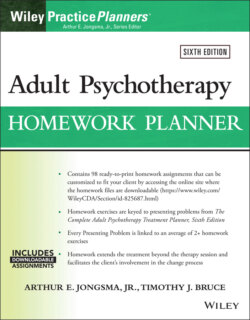Читать книгу Adult Psychotherapy Homework Planner - Arthur E. Jongsma Jr. - Страница 17
На сайте Литреса книга снята с продажи.
CONSTRUCTIVE ALTERNATIVES
Оглавление1 Assertiveness: Speaking forthrightly in a manner that is very respectful of the other person's needs and rights and does not attack anyone so as to make the person defensive.
2 Tune Out/Cool Down: Recognize that the situation has become volatile and nonproductive and suggest withdrawal from the situation to give each party a chance to cool down and collect their thoughts and regain personal control.
3 Relaxation: Learn and implement relaxation skills to reduce stress and tension through the use of words that cue relaxation, deep breathing that releases tension, imagining relaxing scenes, or deep muscle relaxation procedures.
4 Diversion: When anger is felt to be building, find diversionary activities that stop the buildup and focus the mind on more enjoyable experiences.
5 Physical Exercise: When anger and tension levels rise, physical exercise can be a wonderful way to release tension and expel energy as an alternative to losing control or exploding in rage.
6 Problem‐Solving Skills: Identify or clarify the problem, brainstorm possible solutions, review the pros and cons of each alternative solution, select the best alternative for implementation, evaluate the outcome as to mutual satisfaction, and finally, adjust the solution if necessary to increase mutual satisfaction.
7 Self‐Talk: Take time to talk to yourself in calming, reasoned, and constructive sentences that move you toward anger control and away from hurtful expressions of anger.
8 “I” Messages: Speak to the target of your anger, describing your feelings and needs rather than attacking, labeling, or describing the other person's behavior, motivations, or goals. Begin your sentences with “I feel . . .” or “I need . . . .”
9 Other: Describe your own or your counselor's alternative to rage.
